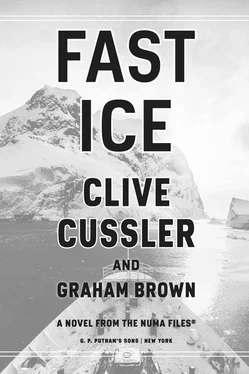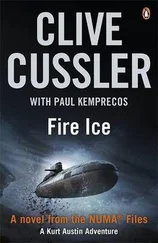He checked his watch. The ship should have been almost full and low in the water by now. In fact, had things gone according to schedule it should have cleared the artificial island and begun its journey north.
Ryland gave the pilot a new order. “Get me on the platform as soon as possible.”
The pilot brought the helicopter down on the helipad with authority, planting its landing gear firmly on the deck. As the ground crew rushed to secure the craft, Ryland and Yvonne left the helicopter in search of the platform’s Chief of Operations, a man named Ober.
They found him on the north side of the rig, standing near the rail with a radio in his hand. He was overseeing the tanker operation personally, barking orders and marking the progress on a clipboard.
“What’s the holdup?” Ryland demanded. “That ship was supposed to be on its way by now.”
Ober understood the stakes. He was one of Ryland’s oldest hands. He’d been part of the inner circle from the beginning. “The wind made the initial docking cumbersome. Getting the tanker in position took a while. Hooking up the pipes was another issue. She’s secured and loading now.”
“Any problems with the crew?”
“Not really,” Ober said. “And as far as they know, we’re pumping light sweet crude directly from the well. They probably think it’s a black market deal,” he added. “I’m sure it wouldn’t be the first time. I’m not sure what happens if they inspect the tanks and find a mix of seawater and slurry. But I’m assuming they have orders not to.”
“They won’t question the cargo,” Ryland insisted.
“Happy to hear it,” Ober said. “What about Liang?”
“He knows what he’s getting,” Ryland said. “Up to a point, at least. It’s been explained to him that the slurry is food for the algae. He just doesn’t know what the algae is going to do when these tankers dump it in the sea.”
Ober nodded and allowed a look of pride to come over his face. For eight years, he’d been part of Ryland’s long-term plan. He’d worked on oil rigs and ramrodded efforts at various mines, earning a reputation as a ruthless taskmaster—all while waiting for the moment that Ryland had promised would come, when they would emerge from hiding and change the world. “So, this is it? It’s finally time?”
Ryland nodded. “It’s time. And the sooner we get these ships loaded and sent on their way, the better. The next tanker is due here in three hours. Can you get this one filled by then?”
Ober shook his head. “I’ll need five hours at least,” Ober said. “Unless you want me to send her out a little light.”
“No,” Ryland said. “Top her off. I’ll contact Liang and have him delay the other vessel.”
Ober nodded and got on the radio, giving a new order to the tug that was helping keep the huge tanker in position.
“Have the turbines arrived?” Yvonne asked.
“They were delivered this morning,” Ober said. “We hoisted them aboard and kept them on the cable. The crane operator is standing by to load them whenever your transport arrives.”
“It’s already here,” Yvonne said.
Ober looked at her oddly. “Where?”
She pointed to the water beneath the platform. Ober leaned over the rail for a better look. A long, tubular shape rested in the shadows of the oil platform. The vessel was grayish white in color, like an old koi swimming in a murky pond.
“Would you like me to assist?”
“No,” Ryland said. “We’ll take care of the turbines. You just get that tanker loaded and on its way. I want it off the platform and heading for the open sea as soon as possible.”
35
NUMA HEADQUARTERS
Rudi stared at the list of equipment Joe Zavala was requesting. He didn’t recognize half of what was written there. “Are you planning an expedition to Antarctica or a trip to the moon?”
No longer in the high-tech conference room, he was talking with Joe on an old-fashioned speakerphone. It felt positively antiquated.
“Antarctica is more treacherous than the moon,” Joe insisted. “No storms on the moon. No snow or hidden crevasses waiting to swallow up men and equipment. No hundred-mile-an-hour winds or killer penguins.”
“Except for the last part,” Rudi said, “you have a point. About the only thing I recognize on this list are the electrically powered snow machines. I assume that’s a type of snowmobile?”
“One that doesn’t make a lot of noise,” Joe said. “Or give off much heat. Helpful if the bad guys are looking for us with infrared cameras.”
Rudi could see where this was going. “Understandable. But what on earth is a ‘haptic feedback suit with remote linkup’?”
“It’s a suit with a virtual reality system built into it,” Joe said. “Allows the person wearing it to control vehicles, drones and automated scouting systems.”
“Automated scouting systems?”
“Robots,” Joe said.
“Are we sending you any robots?”
“We have a few on the list. Don’t worry, you won’t need to pay for seats in first class. They’re relatively compact and stored in small boxes. We’ll put them together on-site if we need them.”
“At least you’ve got standard cold-weather gear and high-calorie food supplements on the list. There’s also something called a snow racer? Tell me that’s not a car with studded tires.”
“It’s a lightweight craft that flies over the snow with only a couple skis touching the ground. Like the drones, it’s portable and can be put together on location. And because it’s sail-powered, it’s fast and silent and creates no heat signature.”
“Sounds like Kurt’s ice yacht,” Rudi said.
“Very similar.”
“Let’s hope Kurt’s better at driving this contraption than he was piloting that.”
“He could hardly be worse,” Joe said with a laugh.
Rudi checked a box next to the snow racer, to confirm his approval, and then quickly checked the rest of the boxes. “I’ve approved everything,” Rudi said. “It’ll be airlifted to you overnight. But then what? Has Kurt found a suitable boat yet?”
Joe hesitated, which Rudi took to mean he was choosing his words carefully.
“As I understand it, he’s kicked the tires on a few things and is close to making a decision.”
“Why does that sentence fill me with dread?”
“Because you know Kurt too well,” Joe replied. “How close are we to figuring out a location? This equipment isn’t going to do us much good if we still have to wander around half the continent hoping to bump into Ryland and his sister.”
Rudi glanced at the clock on the wall. He’d been waiting to place a phone call until he could be sure it would be answered in person. “I’ll let you know when I have something. Hopefully, pretty soon.”
As Joe signed off, Rudi sat quietly. He waited for the numbers on his digital clock to read 5:01. As soon as the last digit changed, he picked up the phone and dialed the private line of an old friend at the Pentagon.
The line rang three times before a gruff voice answered. “This is Whitaker.”
Rudi leaned back in his chair. “Good evening, Nate. This is Rudi Gunn.”
Silence for a second, then, “That’s Rear Admiral Nate to you, Gunn. I’ve got an anchor and a star on my shoulder these days.”
Rudi laughed. “Sorry about that, Admiral. I guess I still remember you as a fourth-class plebe at Annapolis. A scrawny kid whom I had to rescue from trouble and mold into a successful midshipman.”
Nathanial Whitaker and Rudi Gunn had been students at the Naval Academy together. Whitaker was in the class behind Rudi, who was charged with mentoring the younger man. Over the years, they formed a strong bond. When Rudi graduated first in his class, Whitaker arranged a party that went nonstop for two days. A year later, when Whitaker graduated second in his class, Rudi returned the favor. He threw his friend an equally epic soirée and began a lifelong habit of needling Whitaker about his lowly class ranking.
Читать дальше












